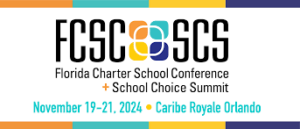Education is no longer about students sitting in rows of desks from 8 a.m. to 3 p.m. And school choice, the term supporters used for years to describe the movement for education options is out. Parent-directed education is in.
That was the call to arms Florida charter school leaders received from one of their earliest supporters on the closing day of an annual gathering convened by the state’s Department of Education.

“We were charged to be laboratories of innovation,” said Jim Horne, a former Florida education commissioner and lawmaker who sponsored the Sunshine State’s first charter school bill. “I challenge you to step out of the proverbial box. If you don’t innovate, you will stagnate.”
Education savings accounts, which allow parents to direct public education funding to private schools, tutoring, curriculum and other options for their children, have been sweeping the country and are now in effect in 19 states.
This has led some national observers to wonder whether charter schools risk losing momentum or becoming political orphans.
Manny Diaz Jr., Florida’s education commissioner, has pushed to counter that chatter. In his keynote address last year, he said education options of all kinds can flourish in the Sunshine State, which is home to the nation’s largest ESA programs and a growing charter school sector.
“We’re capitalizing on this historic school choice and charter school movement. We’re giving parents the ability to choose the best path for their students, regardless of background, regardless of income.”
Last year, the state rechristened its annual convening of charter school leaders as the Florida Charter School Conference and School Choice Summit. This year, private school leaders and educators made up nearly a quarter of the 1,300 attendees.
This year’s event featured main-stage presentations by Success Academy founder Eva Moskowitz, whose New York-based charter school network began eyeing a Florida expansion, as well as presentations on improvements in public-school student achievement, and multiple sessions that highlighted the opportunities growing scholarship programs offer to charter schools.
Last year’s House Bill 1 supercharged the growth of Florida’s ESA programs and created a new Personalized Education Program for students who don’t attend school full-time. That, combined with continued growth of New Worlds Scholarship Accounts for public-school students who need extra academic help, and the existing program for students with unique abilities, creates a substantial opportunity for public schools, including charters, to offer services to scholarship students.
Between those three programs alone, “we’re talking about $1 billion from students that do not have to go to school,” David Heroux, senior director of provider development and relations for Step Up For Students, which manages the bulk of Florida’s K-12 education choice scholarships, said during one session.
School districts, including Brevard and Glades counties, have already begun offering individual courses to scholarship students, with others planning announcements soon or expressing interest in participating.
Adam Emerson, executive director of the Florida Department of Education’s Office of Independent Education and Parental Choice, urged attendees to join the school districts in embracing a la carte learning and the possibilities it has unlocked for charter schools.
“We are entering into a whole new universe of choice,” he said.